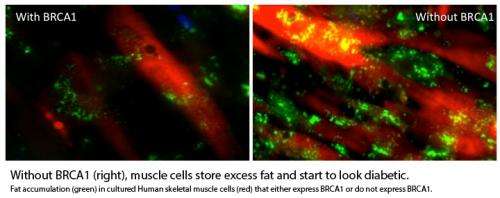Breast cancer gene protects against obesity, diabetes

(Medical Xpress)—The gene known to be associated with breast cancer susceptibility, BRCA 1, plays a critical role in the normal metabolic function of skeletal muscle, according to a new study led by University of Maryland School of Public Health researchers. Dr. Espen Spangenburg, associate professor of kinesiology, and his laboratory team are the first to identify that the BRCA1 protein is expressed in the skeletal muscle of both mice and humans, and that it plays a key role in fat storage, insulin response and mitochondrial function in skeletal muscle cells. The research is published in the Journal of Lipid Research.
"Our findings suggest that certain mutations in the BRCA1 gene may put people at increased risk for metabolic diseases like obesity and type 2 diabetes," said Dr. Spangenburg. "Without BRCA1, muscle cells store excess fat and start to look diabetic. We believe that the significance of the BRCA1 gene goes well beyond breast cancer risk."
Dr. Spangenburg and colleagues, including researchers from the University of Maryland School of Medicine, Brigham Young University, Karolinska Institutet in Sweden, and East Carolina University, found that the BRCA1 protein exists in both mouse and in human skeletal muscle. This is the first evidence since the discovery of BRCA1 in 1994 that the gene is expressed in human muscle cells.
They further established that the protein produced by the BRCA 1 gene binds with a protein known to play an important role in the metabolism of fat in muscle cells known as Acetyl-CoA carboxylase or ACC. After a period of exercise, the BRCA 1 protein binds to ACC, which helps "turns it off." This deactivation of ACC encourages the utilization of fatty acids by the muscle.
Once they established that the two proteins complex together, they sought to answer if BRCA1 plays a critical role in regulating muscle metabolic function. To do so, they "knocked out" the gene so that it was no longer being expressed in the muscle cells cultured from healthy, active and lean female subjects. This was done using shRNA technology specific for BRCA1 in human myotubes (skeletal muscle fiber cells).
The result was that the muscle cells started to look diseased. The removal of BRCA1 from the cells, which simulated what could happen in the cells of a person with a BRCA1 mutation, resulted in increased lipid storage, decreased insulin signaling, reduced mitochondrial function and increased oxidative stress. These are all key risk factors for the development of metabolic diseases, such as obesity, type 2 diabetes and cardiovascular disease.
"Our findings make it clear that BRCA1 plays a protective role against the development of metabolic disease," Dr. Spangenburg explains. "This gene needs to be there, and should be considered a target to consider in the treatment of type 2 diabetes and/or obesity."
More information: Kathyrn C. Jackson, Eva-Karin Gidlund, Jessica Norrbom, Ana P. Valencia, David M. Thomson, Rosemary A. Schuh, P. D. Neufer, and Espen E. Spangenburg. "BRCA1 is a Novel Regulator of Metabolic Function in Skeletal Muscle." J. Lipid Res. jlr.M043851. First Published on February 24, 2014, DOI: 10.1194/jlr.M043851














